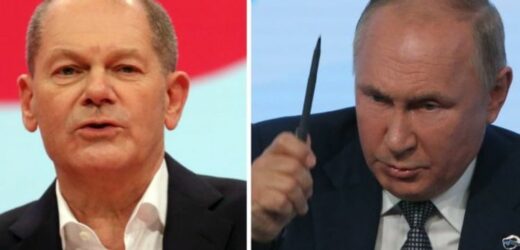Olaf Scholz is sworn in as Germany's new chancellor
We use your sign-up to provide content in ways you’ve consented to and to improve our understanding of you. This may include adverts from us and 3rd parties based on our understanding. You can unsubscribe at any time. More info
The pressure on the new chancellor comes ahead of a pre-summit meeting with Ukrainian President Volodymyr Zelenskiy and French President Emmanuel Macron. Relations between the new German government, sworn in on Wednesday, and Ukraine have so far been tense after Ukraine accused Berlin of blocking NATO’s supply of weapons to Kiev.
Ukraine’s Defence Minister, Oleksii Reznikov said that Berlin had vetoed Ukraine’s purchase of weapons via the Nato Support and Procurement Agency, telling the Financial Times: “They are still building the Nord Stream 2 pipeline and at the same time blocking our defensive weapons. It is very unfair.”
Germany has also controversially stressed the need for dialogue with Russia.
Tensions between Russia and the West have been escalating in recent months, as Russian troops build up on the border with Ukraine.
US intelligence sources are warning that the Kremlin is preparing for a multi-front offensive, as soon as early next year, involving some 175,000 troops.


Mr Putin and Mr Scholz are yet to speak, but a senior German official told POLITICO that it was important to build on the dialogue between the United States and Russia, speaking ahead of the meeting today.
US President Joe Biden and Mr Putin held a two-hour video conference on December 7, as part of an attempt to ease tensions between the two nations.
However, the senior German official added that Berlin would like to send a “clear signal to Russia that the integrity of borders is inviolable and that any violation would trigger clear consequences.”
Earlier this week, the new German Chancellor also warned of “consequences” for the controversial Nord Stream 2 gas pipeline if Russia invades Ukraine.


The pipeline would send gas supplies directly from Russia to Germany, bypassing Ukraine.
The controversial project, which began in April 2018, has been opposed by both Ukraine and the United States.
Critics say the 1,230-kilometre pipeline under the Baltic Sea will increase Europe’s energy dependence on Moscow and make a Russian invasion of Ukraine more likely.
The pipeline was suspended after Germany’s energy regulator said it could not proceed with certification of the pipeline because the company which owns it is registered in Switzerland, not Germany.
DON’T MISS:
Chris Whitty warns hospitals, pubs, shops and restaurants to CLOSE [REPORT]
Brexit talks extended to 2022 as EU refuses to cave [INSIGHT]
Lilibet’s first Christmas to be hugely different from Archie’s [ANALYSIS]

Despite reportedly tense relations with Ukraine, the new German Chancellor has also stressed his commitment to safeguarding Ukraine’s role as a transit route for gas into Europe.
However, the new government has not made a public commitment to block the pipeline.
During his first visit to Poland as chancellor, Mr Scholz said Germany felt responsible for ensuring that Ukraine’s gas transit business was successful, echoing his predecessor Angela Merkel.

Speaking at a joint press conference with Polish Prime Minister Mateusz Morawiecki, Mr Scholz said: “The same goes for future opportunities.
“We will also help Ukraine be a country that will be a major source of renewable energy and the necessary production that results from that.
“We are in concrete talks around how we can help achieve that.”
Source: Read Full Article


